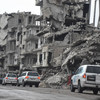 The UN Security Council on Thursday failed to reach consensus on either of two competing resolutions on a cessation of hostilities in Idlib, Syria, the last province in the war-torn nation that is still largely held by rebel forces.
The UN Security Council on Thursday failed to reach consensus on either of two competing resolutions on a cessation of hostilities in Idlib, Syria, the last province in the war-torn nation that is still largely held by rebel forces.
Belgium, Germany and Kuwait tabled a draft proposing a humanitarian ceasefire, which garnered 12 out of 15 votes.
Permanent members Russia and China used their right to veto, blocking its adoption. Their own resolution, which highlighted terrorism concerns by extremist groups operating inside the region, also failed to pass, with nine members voting against and four abstaining.
Ursula Mueller, the UN Assistant Secretary-General for Humanitarian Affairs, who spoke prior to the voting, said a unilateral ceasefire announced by Russia on August 30 has reportedly led to a decline in fighting in the northwestern region. However, insecurity and an “alarming” humanitarian situation persist.
“The fragile ceasefire has brought into focus an outlook that, for this Security Council should be all too familiar: Further fighting will endanger and displace thousands of civilians. Further displacement will create even more needs. Further needs will stretch humanitarians that are already at their limit”, she told the Council.
“The world is watching…in hopes that a more humane outlook for Syria will be created, one where civilians are safe, needs are addressed, and humanitarians are protected.”
According to the UN, humanitarians reach more than 1.6 million people in the Idlib region every month through cross-border operations from Turkey.
Some 400,000 residents have fled their homes since May, following an escalation of military operations. They have been pushed to areas near the border, which are already densely populated, thus further straining host communities.
Ms. Mueller stressed that shelter is a major concern. Increased demand and short supply mean that many families cannot afford a place to live. With winter approaching, humanitarians estimate they will need more than $68 million to help those in need.
“A survey earlier this month found that about 600,000 people live in tents, camps and sites for internally displaced persons. Humanitarian partners report that, in the absence of viable alternatives, families in some areas resort to living out in the open,” she said.
Last month, UN Secretary-General António Guterres announced the establishment of an internal Board of Inquiry into conflict-related incidents that have taken place in northwest Syria since last September, when Russia and Turkey signed a deal to create a demilitarized buffer zone in Idlib.
Damage or destruction to facilities on the deconfliction list and to UN-supported facilities will be among the matters to be investigated when the Board begins its work later this month.